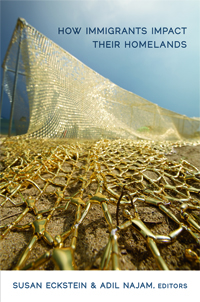Moroccan Migrants as Unlikely Captains of Industry: Remittances, Financial Intermediation, and La Banque Centrale Populaire
The impact that remittances – the monies that migrants send home – have on the development on migrant-sending economies is a matter of considerable debate. This essay presents the case of Morocco and its state-controlled bank, La Banque Centrale Populaire (BCP), to argue that the major determinant of remittance impact on development is the quality and breadth of financial intermediation to which migrants have access. By providing a set of financial tools that allowed migrants to deposit, save, and invest with the institution, the BCP, since 1969, simultaneously made remittances funds available the migrants for their personal expenditures and to the Moroccan government for large-scale industrial investment. However, to create financial services for migrants with an appeal broad enough to bring significant amounts of remittance liquidity into the banking sector, BCP had to engage migrants in an open and collaborative process of product design. Ultimately, this paper argues, migrants’ involvement in the design of financial products enabled them to use the banking system to redirect remittances resources to rural and semi-rural areas most migrants were from, and to amend the industrial development priorities of the Moroccan government.
